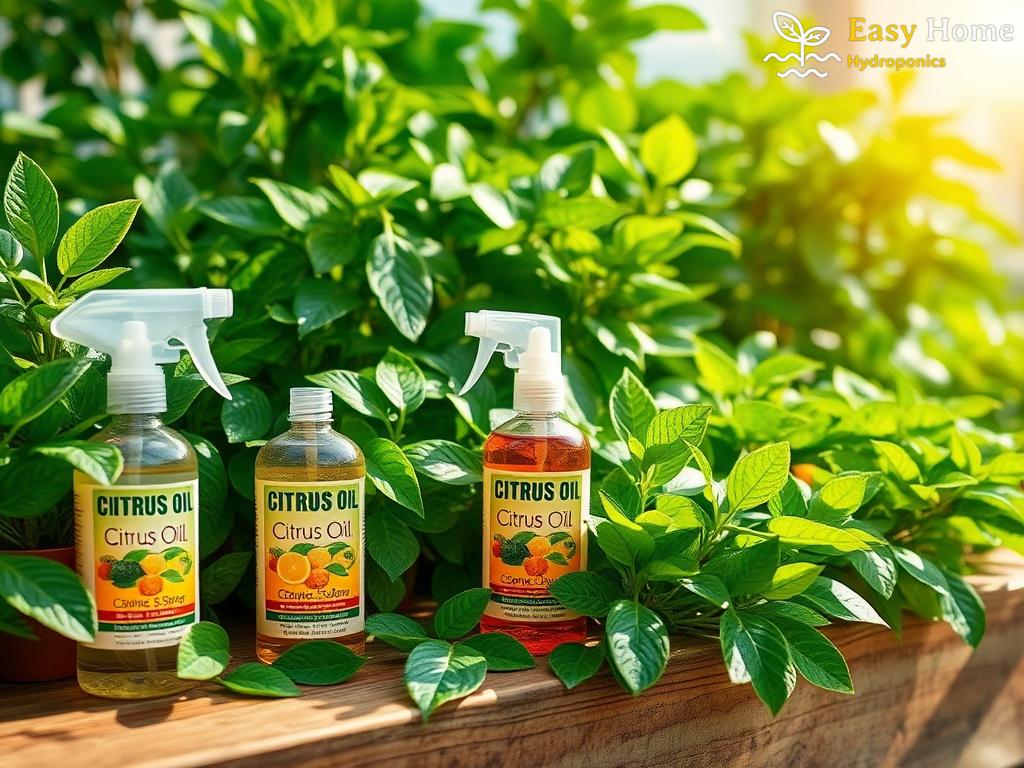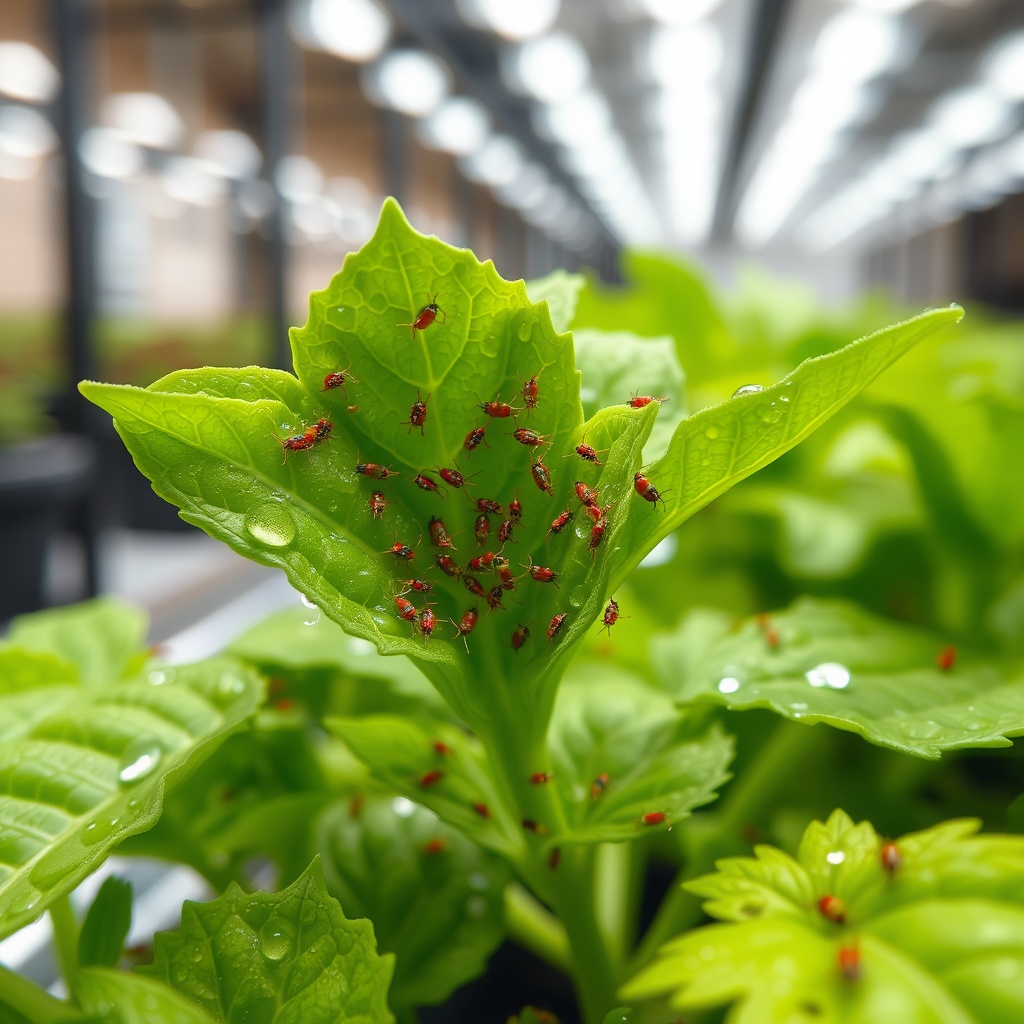Harnessing Citrus: The Power of Essential Oils
In the ever-evolving world of hydroponics, growers are constantly seeking innovative methods to control pests without resorting to harsh chemicals. Enter citrus oil sprays—a natural and potent solution that harnesses the power of essential oils derived from citrus fruits. This approach not only promotes a healthier growing environment but also aligns with the increasing demand for organic produce.
As hydroponic gardening gains popularity, understanding the benefits and applications of citrus oils becomes essential for both novice and experienced growers. Let’s take a closer look at how these oils work and the advantages they bring to your hydroponic setup.
Citrus oils, such as those extracted from oranges, lemons, and grapefruits, are packed with natural compounds that are effective against a variety of pests. These essential oils act as insect repellents and disrupt the life cycles of common hydroponic pests. The science behind their effectiveness lies in compounds like limonene and linalool, which not only repel insects but can also kill them on contact.
Beyond their pest control properties, citrus oils bring additional benefits to hydroponic systems. They can help boost plant health by enhancing essential oil production within the plants themselves, making them more resilient against pests and diseases. This dual action makes citrus oils a powerful ally in the quest for sustainable gardening.
Implementing citrus oil sprays in hydroponics is straightforward, but understanding the right application methods is critical for maximizing their effectiveness. Here are some key steps and considerations:
- Concentration: Citrus oils should be diluted appropriately to ensure effectiveness while minimizing plant stress. A common ratio is 1-2 teaspoons of oil per quart of water.
- Application Timing: Spray during early morning or late evening to avoid sunburn and ensure better adherence to the plant.
- Frequency: Regular applications (every 7-14 days) help maintain pest control without harming beneficial insects.
By integrating these natural sprays into your pest management routine, you not only protect your crops but also contribute to a more sustainable agricultural practice.
Crafting Your Own Citrus Oil Spray: A DIY Guide
For those embarking on the journey of hydroponic gardening, creating your own citrus oil spray can be both an empowering and rewarding experience. Not only does crafting your own formula allow for greater control over the ingredients, but it also enables you to customize the blend to best suit your plant varieties and specific pest challenges. The art of blending essential oils can transform your pest management strategy into a sustainable practice, all while utilizing the natural potency of citrus fruits.
To begin your DIY adventure, gather essential ingredients that will form the backbone of your citrus oil spray. You will need high-quality essential oils derived from citrus fruits such as lemon, orange, or grapefruit. These oils contain potent compounds that repel and disrupt pests effectively. Additionally, you will need a carrier, typically water or a mild soap solution, to help dilute the oils and aid in their application. A spray bottle with a fine mist setting is crucial for even distribution, enhancing the spray’s efficiency.
The magic happens when you combine the ingredients. For optimal effectiveness, a dilution ratio of 1-2 teaspoons of essential oil per quart of water is recommended. This ensures that the solution is potent enough to deter pests while remaining gentle enough on your plants. It is essential to shake the mixture well before each use to keep the oils properly blended. Once mixed, your homemade spray is ready to be tested on a small section of your plants to ensure there are no adverse reactions.
Timing and technique can significantly influence the success of your citrus oil spray. Applying the solution during the cooler parts of the day, such as early mornings or late evenings, helps prevent leaf burn from the sun and allows the oils to adhere better to the foliage. Regular applications every 7-14 days ensure continued pest deterrence without harming beneficial insects. Observing your plants after application will provide insight into the effectiveness of your spray, allowing you to adjust the formulation if necessary.
By taking the initiative to craft your own citrus oil spray, you not only enhance your hydroponic gardening experience but also contribute to a healthier growing environment. The empowerment of DIY pest control can lead to a flourishing garden, showcasing the perfect blend of nature and nurture.
Comparative Effectiveness: Citrus Oil vs. Traditional Insecticides
As the demand for organic produce continues to surge, the agricultural community is reevaluating the tools at their disposal for pest management. In the realm of hydroponics, growers are faced with a choice between conventional insecticides and the emerging trend of natural citrus oil sprays. This comparison goes beyond mere effectiveness; it delves into the health impacts, environmental sustainability, and the broader implications for the future of gardening.
When it comes to efficacy, both citrus oil sprays and traditional insecticides have their merits. Citrus oils, particularly those rich in limonene and linalool, have shown remarkable potency against a variety of pests such as aphids, spider mites, and whiteflies. These natural compounds not only repel but can also eliminate pests upon contact. On the other hand, traditional insecticides often offer immediate results, providing a quick solution to pest problems. However, their effectiveness can diminish over time as pests develop resistance, posing a significant challenge for long-term pest management.
One of the most compelling reasons for opting for citrus oil sprays is their environmental friendliness. Unlike synthetic insecticides that can persist in ecosystems and harm beneficial insects, citrus oils break down naturally, leaving minimal residue. This aspect is particularly vital for hydroponic growers who prioritize sustainability. Moreover, citrus oil sprays pose a lower risk to human health; they are generally regarded as safe for use around children and pets, whereas traditional insecticides often carry warning labels and require careful handling. Such considerations are crucial for those cultivating food crops in home gardens.
While the initial cost of purchasing traditional insecticides may seem lower, the long-term financial implications can be more complex. Routine applications, potential damage from pesticide-resistant pests, and the need for additional treatments can quickly escalate costs. In contrast, crafting your own citrus oil spray can be incredibly economical, enabling gardeners to create a customized pest control solution that suits their specific needs. With a few simple ingredients, growers can achieve a powerful insect deterrent at a fraction of the cost of commercial pesticides, making it an appealing option for budget-conscious gardeners.
Ultimately, the choice between citrus oil sprays and traditional insecticides hinges on the values and priorities of the grower. As hydroponic gardening continues to evolve, so too does the need for effective, sustainable pest management solutions. By embracing the benefits of citrus oils, growers not only protect their plants but also contribute to a healthier planet.
Understanding the Science: How Citrus Oils Disrupt Insect Behavior
At the heart of the efficacy of citrus oil sprays lies a fascinating chemistry that plays a pivotal role in pest management. Citrus oils, notably those extracted from fruits like oranges, lemons, and grapefruits, contain a variety of compounds that interact with the sensory systems of insects. These essential oils, rich in limonene and linalool, are not just pleasant to humans; they create an environment hostile to pests. When insects come into contact with these oils, their behavior is significantly disrupted, leading to a cascade of effects that can thwart their feeding and reproductive activities.
Citrus oils serve as a natural deterrent, altering the normal behavior of various insect pests. For instance, when aphids or spider mites encounter citrus compounds, their olfactory receptors are overwhelmed, rendering them unable to locate food sources effectively. This disruption not only reduces their feeding but also affects their mating behaviors, leading to a decrease in their population over time. Moreover, the contact with citrus oils can induce a state of stress in insects, which further hampers their ability to thrive in the hydroponic environment.
Utilizing citrus oil sprays is not merely about combating pests; it provides a holistic approach to sustainable gardening. Unlike traditional insecticides that can lead to ecosystem imbalances, these natural alternatives decompose quickly and do not accumulate harmful residues in the environment. Incorporating citrus oils into pest management strategies promotes the health of beneficial insects, which play crucial roles in pollination and natural pest control. By disrupting pest behavior without adversely affecting ecological balance, citrus oils represent a forward-thinking solution for hydroponic growers.
Safety First: Using Citrus Oil Sprays in Hydroponic Systems
As the interest in hydroponic gardening continues to grow, so does the emphasis on safe and effective pest management strategies. Among these, citrus oil sprays stand out not only for their pest-repelling properties but also for their safety profile. Understanding how to use these natural solutions correctly is essential for any conscientious grower looking to cultivate healthy, thriving plants without compromising safety.
Understanding Citrus Oil Safety
One of the appealing aspects of citrus oil sprays is their relatively low toxicity compared to traditional chemical insecticides. Derived from the zest and peels of citrus fruits, these oils contain natural compounds like limonene and linalool, which are known for their insect-repelling abilities. However, it’s crucial to remember that, while these substances are generally regarded as safe, they can still pose risks if misused. For example, concentrated citrus oil can cause skin irritation or allergic reactions in some individuals, particularly if applied directly without proper dilution.
Application Techniques for Safe Use
To ensure the safe application of citrus oil sprays, growers should adhere to recommended dilution ratios, typically around 1-2 teaspoons of essential oil per quart of water. This concentration is potent enough to deter pests while minimizing the risk of harming the plants or the people applying it. Additionally, applying the spray during cooler times of the day, such as early mornings or late evenings, can help prevent potential leaf burn resulting from direct sunlight. It’s also wise to conduct a patch test on a small section of the plant before widespread application to observe any adverse reactions.
Protecting Beneficial Insects and Human Health
One of the most significant advantages of utilizing citrus oil sprays is their environmental compatibility. Unlike many traditional insecticides that can linger in the ecosystem and harm beneficial insects, citrus oils break down quickly, presenting a much lower risk to pollinators and other helpful organisms. This makes them a preferred choice for those who want to maintain a balanced ecosystem within their hydroponic systems. Moreover, unlike synthetic pesticides that often come with warning labels and safety precautions, citrus oil sprays are typically safer for use around children and pets, promoting a healthier gardening environment.
| Aspect | Citrus Oil Sprays | Traditional Insecticides |
|---|---|---|
| Toxicity | Low | High |
| Environmental Impact | Minimal | Significant |
| Effect on Beneficial Insects | Low Risk | High Risk |
| Safety for Humans and Pets | Generally Safe | Requires Caution |
In conclusion, while citrus oil sprays offer a plethora of benefits for controlling pests in hydroponic systems, understanding their safe use is paramount. By following proper application techniques and considering the well-being of both plants and beneficial insects, growers can create a thriving, safe environment for their hydroponic gardens. Embracing this natural approach to pest management not only enhances plant health but also aligns with the growing movement toward sustainable gardening practices.




